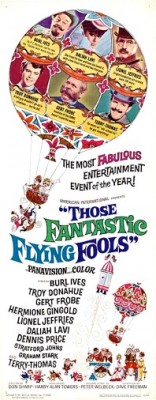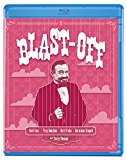| Reviews & Columns |
|
Reviews DVD TV on DVD Blu-ray 4K UHD International DVDs In Theaters Reviews by Studio Video Games Features Collector Series DVDs Easter Egg Database Interviews DVD Talk Radio Feature Articles Columns Anime Talk DVD Savant Horror DVDs The M.O.D. Squad Art House HD Talk Silent DVD
|
DVD Talk Forum |
|
|
| Resources |
|
DVD Price Search Customer Service #'s RCE Info Links |
|
Columns
|
|
|
Blast-Off (Those Fantastic Flying Fools)
Under the film's original British title, Jules Verne's Rocket to the Moon, a DVD label in the UK released it more than a dozen years ago, but cut to 104 minutes. Now, here in America, comes Olive Film's release of Blast-Off, except that it's not the 95-minute Blast-Off at all. The HD transfer on the disc in fact bears the title Those Fantastic Flying Fools and runs the full 119 minutes. The cover art, though attractively Karel Zeman-like in its design, doesn't really hint at what the movie is about.
It's a shamelessly derivative but fairly entertaining period satire-science fiction film. Filmed in Ireland, this mini-epic wears thin during its aimless middle section, but has enough amusing ideas and performances to sustain it through to the end. .
The movie finds Phineas T. Barnum (Burl Ives, in a part intended for Bing Crosby), one step ahead of his creditors, fleeing to Victorian England where he quickly forms a syndicate of eccentric scientists intent on sending a rocket to the moon. Barnum proposes sending midget General Tom Thumb (Jimmy Clitheroe) as mankind's first astronaut, and plans to reap huge profits exhibiting the "moonship" in the months prior to its presumably doomed launch.
Even less scrupulous is Captain Sir Harry Washington Smythe (Terry-Thomas), who is put in charge of the project's finances by the Duke of Barset (Dennis Price), a none-too-bright inventor. Also involved with the moon launch is a German explosives expert (Gert Fröbe), whose "bulovite" will propel the rocket to the moon from a cannon-like tunnel dug deep into a mountain in the Welsh countryside; and a young American (Troy Donahue), whose designs for the moonship prove the undoing of a crooked scientist-rival (Lionel Jeffries).
Jules Verne may get above-the-title billing, but producer Harry Alan Towers pilfered ideas and characters from a dozen other movies for Rocket to the Moon. Terry-Thomas and Gert Fröbe all but reprise their characters from Those Magnificent Men in Their Flying Machines, while Lionel Jeffries finds himself designing his second 19th century rocketship in three short years, having had better luck in First Men "in" the Moon (1964). Troy Donahue's character seems derived from that played by Pat Boone in Journey to the Center of the Earth (1959).
Nevertheless, the picture is particularly good at evoking its period. Towers and director Don Sharp had vividly captured the atmosphere of 1920s London with their first low-budget Fu Manchu movie, The Face of Fu Manchu (1965). Sharp was particularly good at wringing the most out of small budgets, plus he had been a second unit director (the flying sequences) on Those Magnificent Men.
Here, with a much larger budget (though still puny compared with the $10 million Those Magnificent Men . . . ), the two seem to be having fun with little details that successfully evoke the period, more so even than otherwise better Verne adaptations like Journey to the Center of the Earth. Fröbe, for instance, uses a primitive, wind-up megaphone-type device at the construction site, only his invention doesn't quick work, giving Fröbe's voice a hilarious, distorted effect. Terry-Thomas drives an early horseless carriage, but is so cheap that he steals gas from streetlights when his tank runs dry. Throughout the picture there is the beguiling presence of late-Victorian bicycles, tractors, and other products of the early Machine Age, and the rocket itself, a giant full-size prop some 40 feet high, is attractive and convincingly period.
Other production elements likewise do well in evoking Victorian times, from the excellent use of Irish locations to the delightful title design that suggests Georges Méliès. Conversely, most of the film's interiors utilized real Victorian mansions and the like, resulting in really hollow, echoic dialogue that a more polished production would have fixed.
The comedy is hit-and-miss, with the best ideas coming early on. The film opens with a series of amusing gags in which the scientists' inventions go wrong, from Lionel Jeffries's collapsing suspension bridge (a funny special effect courtesy Les Bowie), to Fröbe's proposed mini-cannon, mounted on a soldier's helmet. One of the picture's strengths is that the group of inventors obviously love what their doing. "To this generation," notes the film's narrator (Maurice Denham), "all things seemed possible." Unfortunately, there's not enough of this, particularly as the film becomes bogged down with Terry-Thomas's efforts to thwart the rocket's launch. Dave Freeman, a writer heretofore associated with comedian Benny Hill, is credited with the script, but its herky-jerky structure and unmotivated action is very much in keeping with Towers's uncaring attitude toward such matters. (He contributed the story under his usual pseudonym, Peter Wellbeck.)
Video & Audio
Filmed in Panavision, Those Fantastic Flying Fools looks sparkling, with excellent detail and inky blacks, all the more amazing given that this is really a fairly low-budget movie masquerading as a big budget one. The DTS mono audio (English only) is reasonably good, with John Scott's melodious score coming through just fine. English subtitles are offered on this region "A" disc.
Extras
Just a trailer…
Parting Thoughts
Though hardly a classic, Those Fantastic Flying Fools/Blast-Off/Jules Verne's Rocket to the Moon is pleasant enough, with a fine cast of familiar faces and a look surprisingly faithful to its source. Recommended.
Stuart Galbraith IV is the Kyoto-based film historian largely absent from reviewing these days while he restores a 200-year-old Japanese farmhouse.
|
| Popular Reviews |
| Sponsored Links |
|
|
| Sponsored Links |
|
|
| Release List | Reviews | Shop | Newsletter | Forum | DVD Giveaways | Blu-Ray | Advertise |
|
Copyright 2024 DVDTalk.com All Rights Reserved. Legal Info, Privacy Policy, Terms of Use,
Manage Preferences,
Your Privacy Choices | |||||||
















